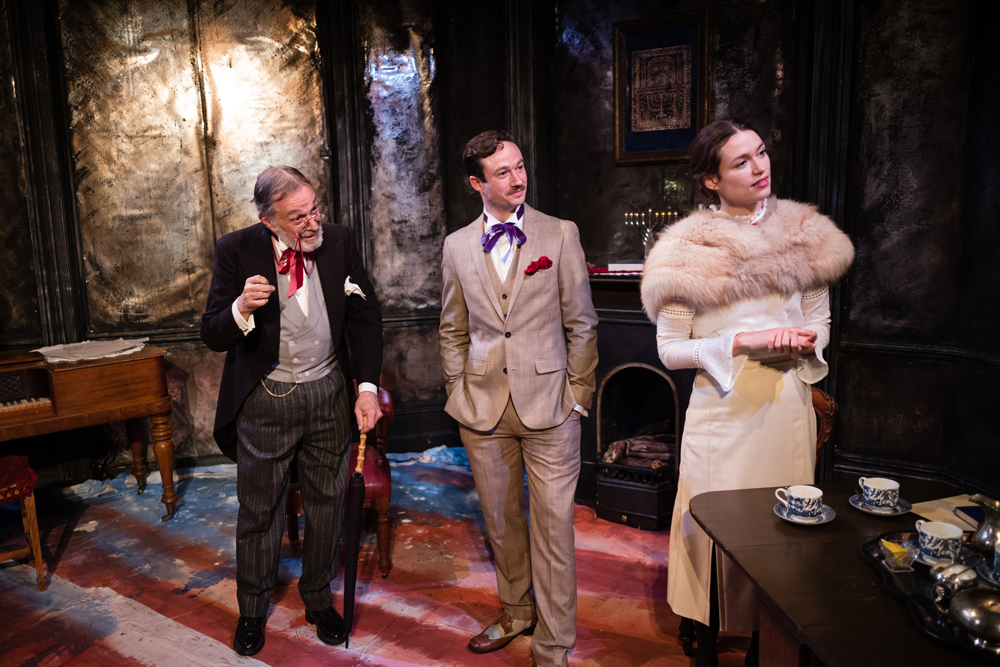Pitch-perfect Pinter in unnerving seaside fun at 60. Is it an accolade if your name becomes an adjective to describe your work as playwright? Brechtian is (perhaps lazy) shorthand for alienation and Pinteresque for menacing. Unsettling menace may permeate…
Cry, Blueberry ★★★★
East ★★★★
Berkoff’s dark exuberant hymn to London’s East End has lost none of its transgressive power. East first shocked and delighted audiences in 1975 and in Jessica Lazar’s production for Atticist Theatre it has lost none of its power. Her five actors relish Berkoff’s marriage of precisely choreographed physical theatre…
Another year, another phenomenal Limmud Festival
The Tin Drum ★★★★
Günter Grass's transgressive Peter Pan, refusing to grow up in 20th-century Europe, proves equally disturbing in Kneehigh's new musical. It’s an odyssey through the first half of the 20th century, an unreliable memoir and a very personal state-of-the-(German) nation allegory – and that's just Günter Grass's epic novel. Now Kneehigh Theatre’s powerhouse
Review: The Melting Pot ★★★★ - Israel Zangwill’s clear-eyed 1908 vision proves urgently topical
 Israel Zangwill, a ferociously intelligent, passionate champion of multiculturalism, escaped poverty in London’s East End thanks in part to his education at the Jews' Free School, where he also subsequently taught for a time. He went on to become a writer, political thinker and activist. He was the first to use the phrase ‘the melting pot’ to describe what he also calls ‘God's crucible’ – America – in this play, endorsed enthusiastically and vocally by then US president Theodore Roosevelt at its 1908 premiere in New York. Now Bitter Pill Theatre produces the first UK revival of The Melting Pot since 1938.
Israel Zangwill, a ferociously intelligent, passionate champion of multiculturalism, escaped poverty in London’s East End thanks in part to his education at the Jews' Free School, where he also subsequently taught for a time. He went on to become a writer, political thinker and activist. He was the first to use the phrase ‘the melting pot’ to describe what he also calls ‘God's crucible’ – America – in this play, endorsed enthusiastically and vocally by then US president Theodore Roosevelt at its 1908 premiere in New York. Now Bitter Pill Theatre produces the first UK revival of The Melting Pot since 1938.
David Quixano, the visionary but damaged Jewish composer at the play’s heart, has survived the massacre of his family in the pogroms rife in the Ukraine, to rebuild his life in New York, taking refuge with his Uncle Mendel. Here too he must fight the prejudice and antisemitism displayed by almost everyone, from his uncle’s Irish housekeeper to the brash young millionaire playboy who is his rival in love for philanthropic socialite Vera Revendal. As the estranged daughter of a Jew-hating Ukrainian Baron, she is initially suspicious of Jews herself (‘That wonderful boy a Jew!?’ she exclaims when she finds out).
Vera calls him wonderful because he has played at a fundraising concert for her settlement project to help New York’s poorest. He’s in the throes of writing a symphony – a paean to the melting pot of America, where the prejudices of the past will disappear as the immigrant races mix to create a utopian multicultural future.
How David fights for his principles, his music and his future happiness is the meat of Zangwill’s drama, in director Max Elton’s sprightly, timely revival. It is of course the current rise of antisemitism and the mass movement of refugees from violence and poverty, coupled with prejudice against ‘the other’, that sadly make it so timely.
Steffan Cennydd is a shining-eyed, boyish David Quixano, delivering idealism bound to win Vera’s tender heart, but also convincingly haunted by terrifying flashbacks to the violence he endured. He’s well matched by Whoopie van Raam’s elegant, equally passionate Vera, an appealing young ‘Lady Bountiful’ with a strong sense of justice. Alexander Gatehouse relishes making Quincy Davenport the man you love to hate, a narcissistic, spoilt, insensitive, cheating and unashamedly racist millionaire used to getting his own way, he makes Zangwill seem topically prophetic. He patronises eminent musician Herr Pappelmeister (delightfully authentic Hayward B Morse), calling him ‘Poppy’, and enjoys matching vicious Baron Revendal’s hatred of ‘the Jew vermin’.
Peter Marinker gives intriguing contrasting portraits of Revendal and David’s fiercely Jewish Uncle Mendel – and narrates as Zangwill too. Ann Queensberry valiantly mumbles entirely in Yiddish as Mendel’s mother and Katrina McKeever enjoys housekeeper Kathleen’s journey from despising such Jewish eccentricities as keeping Shabbat, to enthusiastic apologist for her employers’ traditions. Composer Piers Sherwood Roberts knits the action together with tantalising ‘snatches’ from David’s ‘American Symphony’ in this inspiring symphony to multiculturalism.
By Judi Herman
Photos by Chris Tribble
The Melting Pot runs Until Tuesday 19 December. 7.30pm (Sun-Tue), 2pm (Tue only). £18, £16 concs. Finborough Theatre, SW10 9ED. 0844 847 1652. www.finboroughtheatre.co.uk
Click here to hear our interview with Peter Marinker on JR OutLoud.
Review: Young Frankenstein ★★★★ – Mel Brooks doesn't let good taste get in the way of great stage business
Review: The Secret Theatre ★★★★ – Two Elizabethan ages meet at Shakespeare's Globe in a witty, bloodthirsty game of politics
 In the Wanamaker Playhouse’s candlelit space Jon Bausor’s clever set divulges sinister built-in drawers of files. Conspirators plotting treason discover the hard way that a mole is privy to their plans. Religious refugees fleeing to England in the wake of massacres on the continent find themselves unwelcome in isolationist Britain. Late 16th-century London feels a lot like a John le Carré thriller set right now. And indeed playwright Anders Lustgarten owes his title to le Carré, who wrote “espionage is the secret theatre of our society”.
In the Wanamaker Playhouse’s candlelit space Jon Bausor’s clever set divulges sinister built-in drawers of files. Conspirators plotting treason discover the hard way that a mole is privy to their plans. Religious refugees fleeing to England in the wake of massacres on the continent find themselves unwelcome in isolationist Britain. Late 16th-century London feels a lot like a John le Carré thriller set right now. And indeed playwright Anders Lustgarten owes his title to le Carré, who wrote “espionage is the secret theatre of our society”.
Lustgarten comes from Hungarian Jewish ancestry via American immigrant parents who brought him up in Oxford. He began writing plays teaching in prison in America and his political activism has led to his arrest on four continents. He has previously written about the plight of refugees and an earlier play about Italian artist Caravaggio moves between 17th-century Italy and 21st-century Britain, so this seems a logical progression.
At the heart of his web of intrigue is a spymaster who would chill Smiley to the marrow. Aidan McCardle’s Sir Francis Walsingham is as addicted to espionage as a teenager to their smartphone – and how he would have loved the modern technology evoked by the programme cover showing Queen Elizabeth I caught on surveillance cameras! Lustgarten’s dark and witty latter-day revenge melodrama nails the parallels to Russian influence, fake news and post truth.
Lines such as "our relations with Europe being not what they were" elicit knowing audience laughter. Brexit divisiveness is neatly echoed by a Chippenham man evoking the solidarity of Wiltshire men, only to be felled by a Swindon man, who points out the rivalry between the two towns.
Walsingham’s chilling tactics include setting up a stool pigeon caught with a gun in Queen Elizabeth’s private gardens to prove the necessity for his surveillance by catching and killing this ‘would be assassin’ on the spot. So Mary Queen of Scots has no chance of surviving his tactics facilitating the Babington plot that leads to Elizabeth sanctioning her execution.
Tara Fitzgerald’s arresting Elizabeth looks every inch the chalk-faced, frizzy Titian-haired, sumptuously-gowned Queen. It’s only when she opens what proves a foul mouth to berate Walsingham that she seems more shrew than monarch – a fun reversal.
Cassie Layton has a memorable cameo as Mary, her brave exit to the block cut short by a bloodcurdling scream. She is also an eloquent Frances Walsingham, estranged from her father by his machinations that lead to the death in battle of her husband Sir Philip Sidney (appealingly noble Sam Marks).
Our Protestant antihero does reveal to his daughter that witnessing the St Bartholomew ‘s Day Massacre in Paris at first hand as he sought to offer Huguenots refuge from murderous Catholics in the English ambassador’s residence first motivated his machinations.
He may gain some sympathy, though ultimately he loses all in this game of thrones. But it’s an exhilarating, if bloody, game while it’s afoot in Matthew Dunster’s fast-moving production.
By Judi Herman
Photos by Marc Brenner
The Secret Theatre runs until Saturday 16 December. 7.30pm (Tue-Sat), 6.30pm (Sun only), 1pm & 2pm (days vary). £10-£62. Shakespeare's Globe, SE1 9DT. www.shakespearesglobe.com
Review: Mother Courage and Her Children ★★★ - The mother of all anti-war plays proves a survivor thanks to Josie Lawrence’s damaged Mother
 Brecht’s meditation on war usually gets the loud, raucous in-yer-face treatment from directors. Hannah Chissick’s production of Tony Kushner’s urgent translation, which has an all too contemporary resonance as refugees flee wars across continents, is no exception. Yet Josie Lawrence’s Courage finds moments of quiet – albeit quiet desperation – which are much needed breathers on the gruelling journey through 30 years of war across a ravaged Europe. The desperation is for her children’s plight. She is always the conflicted mother as well as the often unscrupulous wheeler dealer – forced to pay a terrible price to survive, even thrive in the theatre of war. And though she is palpably grungy, Lawrence’s Courage is also younger and sexier than I have seen before, an attractive catch for the Chaplain and the Cook (convincing David Shelley and Ben Fox), who hitch lifts on her supply wagon across those battlefields.
Brecht’s meditation on war usually gets the loud, raucous in-yer-face treatment from directors. Hannah Chissick’s production of Tony Kushner’s urgent translation, which has an all too contemporary resonance as refugees flee wars across continents, is no exception. Yet Josie Lawrence’s Courage finds moments of quiet – albeit quiet desperation – which are much needed breathers on the gruelling journey through 30 years of war across a ravaged Europe. The desperation is for her children’s plight. She is always the conflicted mother as well as the often unscrupulous wheeler dealer – forced to pay a terrible price to survive, even thrive in the theatre of war. And though she is palpably grungy, Lawrence’s Courage is also younger and sexier than I have seen before, an attractive catch for the Chaplain and the Cook (convincing David Shelley and Ben Fox), who hitch lifts on her supply wagon across those battlefields.
This is a religious war, Catholic versus Protestant in a bloody conflagration where the likes of Courage must be quick on their feet to change sides and hoist the right flag when the advantage shifts from one side to the other.
Right up front Brecht/Kushner play devil’s advocate to make a case for the business of war, putting the arguments in the mouths of army recruiting officers, notably that of striking Celeste de Veazey in Chissick’s gender-blind cast. Women make a strong impression throughout, from Laura Checkley’s blowsy woman-in-red Yvette to Phoebe Vigor, mesmerising then heart-breaking as Courage’s dumb, disfigured daughter Kattrin.
There’s useful support from Julian Moore-Cook and Jake Phillips Head as Courage’s sons, honest, simple Swiss Cheese and tougher, less scrupulous Eilif (a chip off the old block). The production’s main drawback is Barney George’s set. The traverse staging looks promising as you enter the auditorium, but when you realise that there is a theatre-long platform behind one half of the seating, which means half the audience has to turn round and risk neck injuries to see action set there (or simply give up and treat it as radio, as I was reduced to doing), the play becomes alienating in a way that Brecht would not have appreciated. It’s especially galling when the cast sing and play Duke Special’s evocative folk music behind you.
Chissick’s direction also proves surprisingly static, Courage’s wagon, adorned with makeshift awnings and barrels, occasionally gets lugged across the floor. When she moves it at the climax though, Lawrence herself is genuinely moving, recruiting audience assistance. I've survived some thrilling epic productions (notably another meditation on war, Peter Brook's unforgettable nine-hour Mahabharata). But here, with a running time of three hours (the programme, presumably printed earlier, has two hours thirty), the war has rather taken its toll by then.
By Judi Herman
Photos by Scott Rylander
Mother Courage and Her Children runs until Saturday 9 December. 7.30pm (Mon-Sat), 3pm (Tue & Sat only). £12-£20. Southwark Playhouse, SE1 6BD. 020 7407 0234. www.southwarkplayhouse.co.uk
Review: Imagine This ★★★ - Brave revival of a musical celebrating courage in the face of persecution across two millennia
 Imagine yourself imprisoned in the Warsaw Ghetto, 1942, facing the dilemma of whether or not to stand up to your Nazi persecutors. You are one of a company of Jewish actors confined there, determined to stage a play about the siege of Masada in 66BC. The siege ended in the mass suicide of the Jews defending the mountain fortress as the Roman besiegers stormed it, so it has long been a symbol of valiant Jewish resistance to persecution. A poem telling this story is said to have inspired the Warsaw uprising, and it’s upon this premise that Shuki Levy (music), David Goldsmith (lyrics) and Glenn Berenbeim (book) based this valiant musical attempt to bring the two uprisings together. Sasha Regan’s award-winning Union Theatre has a fine track record of small-scale musical revivals and it certainly succeeds better than the full-blown 2008 New London Theatre premiere.
Imagine yourself imprisoned in the Warsaw Ghetto, 1942, facing the dilemma of whether or not to stand up to your Nazi persecutors. You are one of a company of Jewish actors confined there, determined to stage a play about the siege of Masada in 66BC. The siege ended in the mass suicide of the Jews defending the mountain fortress as the Roman besiegers stormed it, so it has long been a symbol of valiant Jewish resistance to persecution. A poem telling this story is said to have inspired the Warsaw uprising, and it’s upon this premise that Shuki Levy (music), David Goldsmith (lyrics) and Glenn Berenbeim (book) based this valiant musical attempt to bring the two uprisings together. Sasha Regan’s award-winning Union Theatre has a fine track record of small-scale musical revivals and it certainly succeeds better than the full-blown 2008 New London Theatre premiere.
A Jewish theatre company confined in the Warsaw Ghetto performs a play about the Jews of Jerusalem retreating to Masada, drawing the obvious parallel between their Nazi oppressors and the Roman invaders. Their director Daniel manages to sell this subversive show to Nazi Captain Blick: “It’s got singing, dancing and all the Jews die in the end”. He even manages to hide Adam, a fugitive resistance fighter from the Nazis (Shaun McCourt), by casting him as the humane Roman commander who falls in love with Tamar, daughter of the Jewish leader (Lauren James Ray). Of course Adam falls for Rebecca, Daniel's daughter playing Tamar. And then the Jewish actors face an impossible dilemma, as Adam reveals the truth of the concentration camps…
Levy’s music can be attractive (the opening number recalling ‘The Last Day of Summer’ before the 1939 invasion of Poland, is a wistful earworm. The title song is a great vehicle for Nick Wyschna’s Daniel, keeping his company together against the odds and Wyshna himself is the vital heart of the production. The grim determination expressed in the defiant number Masada, though, becomes an unwelcome earworm, not least because it recurs once too often. Many numbers are simply too long, though all are beautifully played by the hard-working quartet of musicians (piano, fiddle, bass and drums), unaccountably not credited in the programme, apart from MD Alex Williams and musical supervisor Lee Freeman.
The 17-strong company work tirelessly in their roles both as Jews and Nazis and Jews and Romans. Kevan Allen’s choreography is a stunning example of what you can achieve on a simple set. Justin Williams’ multi-levelled platform makes a useful Masada and his terrific collection of crates make useful levels for that dynamic choreography. Harry Blumenau marshals his cast with verve and they tell the story with empathy and passion – and best of all, without microphones.
By Judi Herman
Photos by Nick Brittain
Imagine This runs until Saturday 18 November. 7.30pm (Tue-Sat), 2.30pm (Sat & Sun only). £25, £22.50 concs. Union Theatre, SE1 0LR. www.uniontheatre.biz











